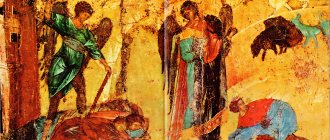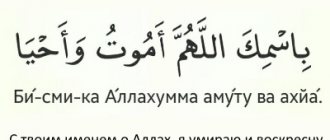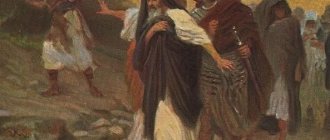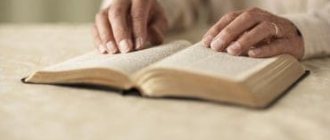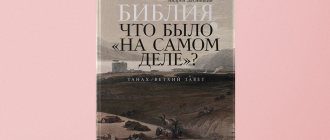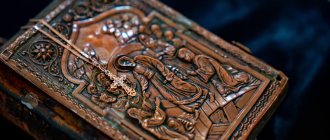The book "Description of the prayer of the Prophet salAllahu alayhi wa sallam."
Muhammad Nasiruddin al-Albani DESCRIPTION OF THE PROPHET'S PRAYER Dedicated. To everyone who knows that the prayers of women and men are different. To everyone who considers themselves a follower of the Hanafi madhhab. To everyone who loves the prophet (peace and blessings of Allah be upon him). To everyone who believes in judgment day and reckoning. To everyone who fears the wrath of Allah. This book should be in the home library of any Muslim. This is not just a description of the prayer of the prophet (peace and blessings of Allah be upon him), it is a book of knowledge filled with evidence for every word written in it. This is educational, very easy material for those who intend from now on and forever to begin to do the most important thing in this life, after witnessing monotheism. The Messenger of Allah (peace and blessings of Allah be upon him) said: “Between belief and disbelief is prayer.” (Muslim) This book is for everyone and anyone who once learned this main worship on their own, via the Internet, through brochures from mosques with titles like: “Namaz according to the Hanafi madhhab” or any other madhhab. For those who were taught by some grandmother, who has only one answer to your questions: “We were taught that way.” Who taught it and why exactly? It is known that all matters related to worship are haram until there is a clear indication of this from the Quran, Sunnah or the decision of the scholars of this ummah. And there is no power or strength except from Allah. Allah Almighty said: “Woe to those who pray who are careless in their prayers” (107:4-5) I ask each and every one who considers himself a Muslim to purchase this manual, in which you will be convinced, based on evidence from the sunnah, that:
- The prayers of men and women are no different
- sutra (barrier) in front of the person praying is obligatory
- hands are placed on the chest for both sexes, and nothing more!
- you cannot recite the Qur'an in a fictitious key in accordance with the rules established in music
- you should raise your hands when bowing
- The elbows in both bows not pressed to the body, but widely spaced
- bowing to the ground must be done only on the hands
- are connected to each other in a prostration
- in tashahhud, the index finger of the right hand constantly raised and slightly moved until the very end
- Dua Kuna in Witr prayer is recited only occasionally
These are the most bare facts from the prayer of the prophet, which Sheikh al-Albani cites in this work. Although the book is educational, it can be read in one breath for about three days, given all the affairs and worries. Moreover, all bida'a and delusions with which modern prayers are crammed are also shattered by the sheikh's arguments. The Messenger of Allah (peace and blessings of Allah be upon him) said: “Whoever commits an act that was not indicated by us, it will be rejected!” (Muslim) I hope in Allah Almighty that he will open the hearts of Muslims to fear of God, because truly only the God-fearing will be saved from the fire of hell. “Then We will save the God-fearing, and leave the wrongdoers there on their knees.” (19:72)
Selected supplications of the Prophet ﷺ
In the name of Allah, the Beneficent, the Merciful
These prayers are from reliable hadiths, and the Prophet (peace and blessings of Allaah be upon him) often addressed Allah with them. And despite their small volume, these du'as contain great benefits that cover both dunya and akhira:
'Aisha (may Allah be pleased with her) said: “One day Abu Bakr came to the Messenger of Allah (peace and blessings of Allah be upon him) and wanted to tell him something, and at that time I was slowly praying. Then the Prophet (peace and blessings of Allaah be upon him) said to me: “O 'Aisha, you should appeal to Allah with short and comprehensive prayers . When I finished the prayer, I asked: “O Messenger of Allah, what is this short and comprehensive prayer?” He said: “Say: “O Allah, verily, I ask you for every good thing that can happen sooner or later from what I know and what is unknown!” And I resort to Your protection from all evil that may happen sooner or later, of which I know and unknown! O Allah, verily, I ask You for the good that Your servant and Prophet Muhammad (peace and blessings of Allaah be upon him) asked You for, and I resort to You from evil in the same way that Your servant and Your Prophet resorted to You! O Allah, truly, I ask You for Paradise, as well as for words and deeds that bring us closer to it! And I resort to Your protection from Hell, as well as from words and deeds that bring me closer to it! And I ask You to make everything that You have predetermined for me good! "" Ahmad 6/146, at-Tawahi in Sharh Mushkil al-Asar 15/290, al-Bukhari in al-Adab al- mufrad” 639, Ibn Majah 3846, Ibn Hibban 866. The authenticity of this hadith was confirmed by the imams: Ibn Hibban, Jamaluddin al-Malta, az-Zahabi, al-Albani. See “al-Mu'tasar minal-mukhtasar” 2/239, “Bulyug al-maram” 1567, “Asl syfa as-sala” 3/1012, “Sahih al-Adab al-mufrad” 497, “Sahih al- jami'" 1276.
All rights reserved. لِهِ، مَا عَلِمْتُ مِنْهُ وَمَا لَمْ أَعْلَمْ، وَأَعُوذُ بِكَ مِنَ وَاجِلِهِ وَآَجِلِهِ مَا عَلِمْتُ مِنْهُ، وَمَا َمْ أَعْلَمْ، اللهُمَّ إِنِّي أَسْأَلُكَ مِنْ خَيْرِ مَا سَأَلَكَ ع َبْدُكَ وَنَبِيُّكَ مُحَمَّدٌ صَلَّى اللهُ عَلَيْهِ وَسَلَّمَأ َعُوذُ بِكَ مِنْ All rights reserved. All rights reserved. وَأَعُوذُ بِكَ مِنَ النَّارِ وَمَا قَرَّبَ إِلَيْهَا مِنْ قَوْلٍ أ وْ عَمَلٍ، وَأَسْأَلُكَ أَنْ تَجْعَلَ كُلَّ قَضَاءٍ تَقْضِيهِ لِي خ َيْرًا
https://yadi.sk/d/w8TCSBVJDLsWqA
Your browser doesn't support HTML5 and this audio can't be played.
/Allahumma inni as-aluka minal-hairi kullihi 'adjilihi ua adjilihi ma 'alimtu minhu ua ma lyam a'lyam!
ӯa a'uzu bika mina-shsharri kullihi 'adzhilikhi ua ajilikhi ma 'alimtu minhu ӯa ma lyam a'lyam! Allahumma inni as-aluka min hairi ma sa-alaqa 'abduka ua nabiyyuk Muhammadun salla-Allahu 'alaihi ua sallam, ua a'uzu bika min sharri ma 'aza minhu 'abduka ua nabiyyuk! Allahumma inni as-alukal-jannata ӯa ma karraba ileikha min kaaulin aӯ 'amal, ӯa a'uzu bika mina-nnari ӯa ma karraba ileikha min kaaulin aӯ 'amal, ӯa as-aluka an taj'ala kulla qada-in taqdyhi li haira / * * *
“My Lord, help me and do not help against me. Make me a winner and don't make me a loser. Make me cunning and do not grant cunning against me. Lead me on the straight path and make my path easier for me, and help me against those who were at enmity with me. My Lord, make me much grateful to You, much in remembrance of You, fearful of You, submissive to You, shy of You, weeping and repentant. My Lord, accept my repentance, cleanse me from my sins, and answer my prayer and strengthen my arguments, make my heart straight and my tongue correct, and cleanse my heart from malice .
at-Tirmidhi 5/554, Ibn Majah 2/1259. See Sahih al-Jami' 3485.
All rights reserved. عَلَيَّ، وَامْكُرْ لِي وَلاَ تَمْكُرْ عَلَيَّ، وَاهْدِنِي وَيَسِّر ِ الهُدَى لِي، وَانْصُرْنِي عَلَى مَنْ بَغَى عَلَيَّ، رَبِّ اجْعَلْ نِي لَكَ شَكَّارًا، لَكَ ذَكَّارًا، لَكَ رَهَّابًا، لَكَ مِطْوَاعًا، ، لَكَ مُخْبِتًا، إِلَيْكَ أَوَّاهًا مُنِيبًا، رَبِّ تَقَبَّلْ تَوْبَتِي، وَاغْسِلْ حَوْبَتِي، وَأَجِبْ دَعْوَتِي، وَ Worldwide َخِيمَةَ صَدْرِي
Your browser doesn't support HTML5 and this audio can't be played.
https://yadi.sk/d/UBleew_r3M98PH
/Rabbi a'inni ӯa la tu'in 'alaiya, ӯansurni ӯa la tansur 'alaiya, ӯamkur li ӯa la tamkur 'alaiya, ӯahdini ua yassiril-khuda li, ӯansurni 'ala man baga 'alaiya. Rabbi-j'alni laka shakkaran, laka zakkaran, laka rahhaban, laka mitua'an, laka mukhbitan, ileika aouahan muniban. Rabbi takabbal-taubati, ӯagsil haubati, ӯa adjib da'ӯati, ӯasabit hujati, ua saddid lisani, ӯahdi kalbi, ӯaslyul-sahimata sadri/
* * *
“O Allah, verily, I resort to You for protection from powerlessness, laziness, cowardice, greed, decrepitude, cruelty, distraction (absent-mindedness), depending on someone, from deviation and from being in need. And I resort to You for protection from poverty, unbelief, wickedness, misfortune, hypocrisy, showing off. And I take refuge in You from deafness, dumbness, madness, leprosy, pigment spots and the worst of diseases.” .
al-Hakim, al-Bayhaqi. See Sahih al-Jami' 1285.
All rights reserved. All rights reserved. َالْعَيْلَةِ، وَالذِّلَّةِ، وَالْمَسْكَنَةِ، وَأَعُوذُ بِكَ مِنَ All rights reserved. الصَّمَمِ، وَالْ بَكَمِ، وَالْجُنُونِ ، وَالْجُذَامِ، وَالْبَرَصِ، وَسَيِّىءِ الأَسْقَامِ
Your browser doesn't support HTML5 and this audio can't be played.
https://yadi.sk/d/4-36qBF03M9A9N
/ Allahumma inni a'uzubika minal-'ajzi, wal-kasali, wal-jubni, wal-bukhli, wal-harami, wal-kas-uati, wal-gaflati, wal-'aylyati, uaz-zillati, wal-maskanati. Ua a'uzubika minal-faqri, wal-kufri, wal-fusuki, uash-shiqaqi, uan-nifaqi, was-sum'ati, uar-riya-i. Ua a'uzubika mina-ssami, wal-bakami, wal-jununi, wal-juzami, wal-barasi, ua sayyi-il-askami/
* * *
“O Allah, endow us with such fear of You, which will be enough to separate us from disobedience to You, and such obedience to You, which will be enough to lead us to Your Paradise, and such conviction, which will be enough to overcome the adversities of this world seemed insignificant to us! O Allah, grant us the use of our hearing, sight and strength while You keep us alive, and do not deprive us of this until we die. And take revenge for us on those who oppressed us, and help us against those who are at enmity with us, and do not allow any disaster to befall our religion. And do not make this world either our greatest concern or the limit of our knowledge, and do not give power over us to those who will not show mercy towards us!”
at-Tirmidhi 3502. See Sahih al-Jami' 1268.
All rights reserved. بَيْنَ مَعَاصِيكَ، وَمِنْ طَاعَتِكَ مَا تُبَلِّغُنَا بِهِ جَنَّتَك َ، وَمِنَ اليَقِينِ مَا تُهَوِّنُ بِهِ عَلَيْنَا مُصِيبَاتِ الدُّنْ يَا، وَمَتِّعْنَا بِأَسْمَاعِنَا وَأَبْصَارِنَا وَقُوَّتِنَا مَا أَحْيَيْتَنَا، وَاجْعَلْهُ الوَارِثَ مِنَّا، وَاجْعَلْ ثَأْرَنَا َلَى مَنْ ظَلَمَنَا، وَانْصُرْنَا عَلَى مَنْ عَادَانَا، وَلاَ تَجْعَلْ مُصِيبَتَنَا فِي دِينِنَا، وَلاَ تَجْعَلِ الدُّنْيَا أَك ْبَرَ هَمِّنَا، وَلاَ مَبْلَغَ عِلْمِنَا، وَلاَ تُسَلِّطْ عَلَيْنَ ا مَنْ لاَ يَرْحَمُنَا
https://yadi.sk/d/3MAhGooL3M9ARz
Your browser doesn't support HTML5 and this audio can't be played.
/Allahumma-kysim lyana min hashiyatika ma yahulyu bainana wa baina ma'asyka, ua min ta'atika ma tuballiguna bihi jannataka, ua minal-yakyni ma tuhauuinu bihi 'aleina musybati-ddunya, ua-matti'na bi-asma'ina, wa-absarina wa-kuuatina ma ahyaytana, waj'alhul-warisa minna, waj'al sa'rana 'ala man zalyamana, wa-nsurna 'ala man 'adana, wa la taj'al musybatana fi dinina, wa la taj'ali -ddunya akbara hammina, wa la mablyag'a 'ilmina, wa la tusallit 'aleina man la yarhamuna/.
* * *
“O Allah, verily, I resort to You for protection from a bad neighbor; and a wife, from whom I will turn gray before my time; from a child who will become master over me; from property that will become torment for me; from a treacherous friend, whose eye sees me, but whose heart lies in wait, and if he sees something good in me, he hides it, and if he sees something bad in me, he divulges it.” .
at-Tabarani in “ad-Du'a” 3/1425. See “as-Silsilya as-sahiha” 3137.
All rights reserved. تُشَيِّبُنِي قَبْلَ الْمَشِيبِ، وَمِنْ وَلَدٍ يَكُونُ عَلَيَّ رَبً ّا، وَمِنْ مَالٍ يَكُونُ عَلَيَّ عَذَابًا، وَمِنْ خَلِيلٍ مَاكِرٍ ع َيْنُهُ تَرَانِي، وَقَلْبُهُ يَرْعَانِي؛ إ/MEN &face حail.Ruuleًَ دail.Ruuleoll ، imes وail.Ru ild ointground
Your browser doesn't support HTML5 and this audio can't be played.
https://yadi.sk/d/zA_IkPLe3M9AnT
/ Allahumma inni a'uzubika min jari ssu-i, ua min zaudzhin tushayibuni kaab-lal-mashib, ua min ualyadin yakunu 'alaiya Rabban, ua min malin yakunu 'alaiya 'azaban, ua min khaalilin makirin 'ainuhu tarani wa kalbuhu yar' ani in ra-a hasanatan dafanaha, ua isa ra-a sayiatan aza'aha/.
* * *
Dua of the prophets Ibrahim and Ismail (peace be upon them)
* َبَّنَا وَاجْعَلْنَا مُسْلِمَيْنِ لَكَ وَمِنْ ذُرِّيَّتِنَا أُمَّا ً مُسْلِمَةً لَكَ وَأَرِنَا مَنَاسِكَنَا وَتُبْ عَلَيْنَا إِنَّكَ أَنْتَ التَّوَّابُ الرَّحِيمُ * رَبَّنَا وَابْعَثْ فِيهِمْ رَسُولًا مَتْلُو عَلَيْهِمْ آيَاتِكَ وَيُعَلِّمُهُمُ الْكِتَابَ و الْمَةَ وَيُزَكِّيهِمْ إِنَّكَ أَنْتَ الْعَزِيزُ الْحَكِيمُ
“Our Lord! Our Creator! Accept this from us. After all, You hear our prayer and know our deepest desires! Our Lord! Make us two Muslims submissive to You, and from our offspring - a Muslim community devoted to You! Teach us the liturgical rites in Your Forbidden Sacred House and accept our repentance, because You are Forgiving, Merciful! Our Lord! And reveal from our descendants a messenger who will convey to them Your signs, teach them the Scripture and useful knowledge sent down by You, and purify their souls. After all, You are truly great and wise in what You do, command, and forbid!” (the meaning of verses 127-129 of Surah al-Baqarah).
Sheikh Muhammad Nasiruddin al-Albani
In the name of Allah, the Gracious, the Merciful
Praise be to Allah, the Lord of the worlds, peace and blessings of Allah be upon our prophet Muhammad, members of his family and all his companions!
And then:
Sheikh Muhammad Nasiruddin Ibn Nuh Ibn Adam Najati al-Albani, may Allah have mercy on him, was born in the city of Shkodra, the former capital of Albania, in 1333 AH (in 1914 according to the Christian calendar). He came from a poor and religious family. His father, al-Hajj Nuh Najati al-Albani, having received a Sharia education in Istanbul (Turkey), returned to Albania and became a major scholar-theologian of the Hanafi madhhab.
After Ahmet Zogu came to power in Albania, and the ideas of secularism began to spread in the country, the family of the future sheikh made a hijra (relocation to save their faith) to Damascus (Syria). Here he received his primary education in a school, which for many centuries served as a refuge for all people who sought knowledge, and then his father began to teach him the Holy Quran, the rules of reading the Quran (Tajwid), Arabic grammar, the law of the Hanafi madhhab and other Islamic subjects creeds. Under the guidance of his father, the boy memorized the Koran. In addition, from Sheikh Said al-Burkhani, he studied the book “Maraqi al-Falah” (the law of the Hanafi madhhab) and some works on linguistics and rhetoric, while simultaneously attending lectures by many outstanding scientists, among whom Muhammad Bahjat Baytar and Izuddin at- Tanukhi. Sheikh al-Albani also learned the craft of a watchmaker from his father, succeeded in it and became a famous master, from which he earned his living.
Contrary to his father's objections, the son began a deeper study of hadith and related sciences. The family library, which mainly consisted of various works of the Hanafi madhhab, could not satisfy the needs and thirst for knowledge of the young man. Not having sufficient funds to purchase many books, he took them from the famous Al-Zahiriyya library in Damascus or was forced to borrow them from book dealers. At that time he was so poor that he did not even have enough money to buy notebooks. Therefore, he was forced to pick up sheets of paper on the street - often discarded postcards - in order to write down hadiths on them.
From the age of twenty, being influenced by articles from the magazine Al-Manar, which were written by Sheikh Muhammad Rashid Rida, where he revealed the degree of reliability of the hadiths in al-Ghazali's book “The Resurrection of the Sciences of Faith” through criticism of the reliability of their chains of transmitters (isnads), Sheikh al-Albani began to specialize in hadith studies and related sciences. Noticing in the young man signs of a bright mind, extraordinary abilities, excellent memory, as well as a strong craving for learning Islamic sciences and hadiths, Sheikh Muhammad Raghib at-Tabah, a historian and hadith expert in the city of Aleppo, gave him permission (ijazah) to transmit hadiths from his a collection of reports on reliable transmitters entitled “Al-Anwar al-Jaliyah fi Mukhtasar al-Asbat al-Halabiyyah.” In addition, some time later, Sheikh al-Albani also received ijaza from Sheikh Muhammad Bahjat Baytar, from whom the chain of hadith transmitters goes back to Imam Ahmad, may Allah have mercy on them.
The sheikh's first hadith work was the rewriting of the manuscript and the compilation of notes to the monumental work of the largest hadith expert (hafiz) al-'Iraqi "Al-Mughni 'an-Hamli-l-Asfar fi Tahrij ma fi al-Ihiyya min-al-Akhbar", which contains about five thousand hadiths. From that moment until the end of his life, Sheikh al-Albani's main concern was serving the noble science of hadith.
After some time, he became famous in the scientific circles of Damascus. The directorate of the Az-Zahiriyya Library even allocated him a special room for research and a key to the library's book depositories, where he could work from early morning until late at night. Sheikh al-Albani was so immersed in the science of hadith that he sometimes closed his watchmaking workshop and stayed in the library for twelve hours a day, stopping only to perform namaz. Quite often he did not even leave the library to eat, making do with a couple of sandwiches he had taken with him. One day, when Sheikh al-Albani examined the hadith contained in the manuscript of “Zamm al-Malahi” by Hafiz Ibn Abi Dunya, he discovered that it was missing one important volume. To find the missing pages, he began to compile a detailed catalog of all hadith manuscripts stored in the library. As a result, Sheikh al-Albani became thoroughly acquainted with the contents of ten thousand manuscripts, which was attested years later by Dr. Muhammad Mustafa Azami, who, in the preface to his book A Study of Early Hadith Literature, wrote: “I wish to express my gratitude to Sheikh Nasiruddin al-Albani for putting at my disposal his extensive knowledge of rare manuscripts.”[1]
During this period of his life, Sheikh al-Albani wrote dozens of useful works, many of which have not yet been published[2]. The sheikh's first original work, based solely on knowledge of Sharia arguments and the principles of comparative fiqh, is the book “Tahzir al-sajid min ittikhazi-l-kubur masajid” (“A warning to the worshiper against choosing graves as places for prayer”), which was subsequently published many times . One of the first collections of hadiths that Sheikh al-Albani checked for authenticity was al-Mu'jam al-Saghir by at-Tabarani.
Simultaneously with his work in the library, the sheikh also began to make monthly trips to various cities in Syria and Jordan, urging people to follow the Book of Allah and the Sunnah of His Messenger, may Allah's peace and blessings be upon him. In addition, in Damascus, he visited many sheikhs with whom he had discussions on issues of monotheism (tawhid), religious innovations (bid'a'), conscious adherence to scientists (ittiba') and blind adherence to madhhabs (at-ta'assub al-mazhabiyy ). It should be noted that on this path Sheikh al-Albani endured many difficulties and trials. Many people from among the fanatical supporters of madhhabs, Sufis and adherents of religious innovations took up arms against him. Moreover, they incited the common people against the sheikh, attaching various labels to him. Meanwhile, the respected scholars of Damascus, known for their deep knowledge of religion, fully supported the Islamic call (da'wa) of Sheikh al-Albani, encouraging him to further ascetic activity. Among them, it is especially necessary to highlight such venerable scholars of Damascus as Sheikh Muhammad Bahjat Baytar, Sheikh Abd al-Fattah and Imam Tawfik al-Bazrakh, may Allah have mercy on them.
After some time, Sheikh al-Albani began teaching. His classes, which university students and teachers attended twice a week, addressed issues of Islamic faith (aqida), law (fiqh), hadith and other sciences. In particular, Sheikh al-Albani completely read the course of lectures and analyzed in his classes the content of the following classical and modern works on Islam: “Fath al-Majid” by Abdurrahman ibn Husayn ibn Muhammad ibn Abd al-Wahhab, “ar-Rawda an-Nadiyya” Siddiq Hasan Khan (commentary to the work of al-Shaukani “ad-Durar al-Bahiya”), “Usul al-Fiqh” by Khallaf, “al-Ba’is al-Khasis” by Ahmad Shakir (commentary to the book “Ikhtisar Uloom al-Hadith "Ibn Kasir), "Minhaj al-Islam fi al-Hukm" by Muhammad Asad, "Mustalah at-Tarikh" by Asad Rustum, "Fiqh al-Sunnah" by Said Sabik, "At-Targhib wa at-Tarhib" by al-Munziri, " Riyadh al-Salihin" by al-Nawawi, "Al-Imam fi Ahadith al-Ahkam" by Ibn Daqiq al'Iida.
Recognition of the sheikh's merits in the field of hadith came quite early. Thus, already in 1955, the Faculty of Shariah of the University of Damascus, which was preparing for the release of an encyclopedia of Islamic law (fiqh), instructed him to indicate sources and verify the authenticity of hadiths related to trade transactions in the field of purchase and sale. Some time later, during the period of the United Arab Republic [3], the sheikh was elected as a member of the Hadith Committee, which was responsible for publishing books on the Sunnah and checking the hadiths contained in them.
After a number of his works were published, Sheikh al-Albani was invited to give a course of lectures on the sciences of hadith at the Islamic University of Medina (Saudi Arabia), where he worked from 1381 to 1383. Hijra, also becoming one of the members of the University leadership. Thanks to his efforts, the teaching of hadith and related sciences rose to a qualitatively different, higher level. As a result, many more students began to specialize in Hadith studies and related disciplines. In recognition of the sheikh's services, he was awarded the title of professor at the Islamic University of Medina. He then returned to his previous studies and work in the Az-Zahiriya library, transferring his own watch workshop to one of his brothers.
Sheikh al-Albani visited many countries with a series of lectures (Qatar, Egypt, Kuwait, UAE, Spain, Great Britain, etc.). Despite the fact that he became widely known throughout the world, he never had any desire for fame. He often liked to repeat the following words: “The love of fame breaks a man’s back.”
Sheikh al-Albani took part in many television and radio programs, mainly answering various questions from television viewers and radio listeners. In addition, anyone could call the sheikh at home and personally ask him a question. According to eyewitnesses, Sheikh al-Albani in this case interrupted his work, listened carefully to the question, delving into all its details, and then answered it in detail and thoroughly, pointing out the source of the reference he cited, its author, and even the page number where it is located. It should be noted here that the sheikh answered not only questions of a religious and legal nature, but also questions related to methodology (minhaj), thereby becoming one of the first scientists who gave answers to questions of this kind. Sheikh al-Albani repeatedly emphasized the importance of combining the correct creed (aqida) and the correct methodology (minhaj), based on the Qur'an, Sunnah and the path of the righteous predecessors from the first generations of Muslims.
Major Islamic theologians and imams spoke respectfully of Sheikh al-Albani. They consulted with him on issues of a religious and legal nature, visited him, and exchanged letters. Sheikh al-Albani met and maintained active correspondence with leading hadith experts in Pakistan and India (Badiuddin Shah al-Sindi, Abd al-Samad Sharafuddin, Muhammad Mustafa Azami), Morocco (Muhammad Zamzami), Egypt (Ahmad Shakir), Saudi Arabia (Abd al-Aziz ibn Baz, Muhammad al-Amin al-Shanqiti) and other countries.
The contribution of Sheikh al-Albani to the science of hadith and his enormous merits in this field have been witnessed by many Muslim scholars of the past and present: Dr. Amin al-Misri (head of the department of Islamic studies of the Islamic University of Medina, who considered himself one of the students of the sheikh), Dr. Subhi as -Salah (former head of the Faculty of Hadith Studies at the University of Damascus), Dr. Ahmad al-Asal (head of the Department of Islamic Studies at the University of Riyadh), Sheikh Muhammad Tayyib Awkici (former head of the Faculty of Tafsir and Hadith at the University of Ankara), not to mention such sheikhs as Ibn Baz, Ibn al-Usaymin, Muqbil Ibn Hadi and others.
The Scientific Heritage of Sheikh Al-Albani
As for the scientific heritage of Sheikh al-Albani, it is quite large. During his life, he wrote 190 books, checking the authenticity of the hadiths contained in 78 works on Islam, written by the largest Islamic scholars. It should be noted here that Sheikh al-Albani studied and researched hadiths for more than sixty years, checking the authenticity of over 30 thousand individual isnads contained in tens of thousands of hadiths. The number of fatwas issued by the sheikh is about 30 volumes. In addition, over 5 thousand lectures of the Sheikh were recorded on audio cassettes.
It is noteworthy that the extraordinary abilities and talent of Sheikh al-Albani manifested themselves not only in scientific research, but also in everyday life. For example, in his house on the outskirts of Amman, where the sheikh moved towards the end of his life, he personally built a water heater powered by solar energy, an elevator that took him to the second floor (in his old age it became difficult for the sheikh to climb stairs), a sundial that was installed on the roof of the house and accurately indicated prayer times, as well as other useful things.
As noted earlier, Sheikh al-Albani put a lot of effort into checking and selecting reliable hadiths from weak or fictitious ones. Thus, he checked for authenticity the well-known collections of hadiths by at-Tirmidhi, Abu Dawood, an-Nasa'i, Ibn Majah, as-Suyuti, al-Munziri, al-Haythami, Ibn Hibban, Ibn Khuzaima, al-Maqdisi and other muhaddis. In addition, Sheikh al-Albani checked the authenticity of the hadiths contained in the works of famous theologians of the past and present: “Al-Adab al-Mufrad” by Imam al-Bukhari, “Al-Shama’il al-Muhamadiyya” by at-Tirmidhi, “ Riyadh al-Salihin" and "Al-Adhkar" by Imam an-Nawawi, "Al-Iman" by Sheikh-ul-Islam Ibn Taymiyya, "Ighasat al-Luhfan" by Ibn al-Qayyim, "Fiqh al-Sunnah" by Said Sabik, " Fiqh as-Sira” by Muhammad al-Ghazali, “Al-Halal wa-l-Haram fi-l-Islam” by Yusuf Qaradawi and many other famous books. Thanks to Sheikh al-Albani, who compiled separate volumes in which he collected weak and reliable hadiths, Islamic scholars and ordinary Muslims are able to distinguish weak and fictitious hadiths from reliable and good ones.
Sheikh al-Albani also himself wrote excellent books and articles on Islam, among which special mention should be made of such books as “At-Tawassul: anwa'uhu wa ahkamuhu” (“The search for getting closer to Allah: its rules and types”), “Hijjatu nabiyy, salla Allahu 'alayhi wa sallam, kamya rawaha 'ankhu Jabir, glad Allah 'anhu" (“Hajj of the Prophet, may the peace and blessing of Allah be upon him, about which Jabir told, may Allah be pleased with him”), “Manasik al-Hajj wa al-Umra fi al-Kitab wa as-Sunnah wa Asari as-Salaf" (“Rituals of Hajj and Umrah according to the Book (of Allah), the Sunnah and the traditions of the righteous predecessors"), “Sifat salat an-Nabiy, salla- Allahu 'alayhi wa sallam, min at-takbir ila-t-taslim kya'anna-kya taraha" (“Description of the prayer of the Prophet, may the peace and blessings of Allah be upon him, from the very beginning to the end, as if you saw it with your own eyes"), "Ahkam al-Jana'iz wa bidauha" ("Funeral rules and related religious innovations"), "Fitna at-Takfir" ("Disturbance caused by those who accuse Muslims of unbelief") and many others .
Sheikh al-Albani raised and educated many students who are today famous throughout the world. Among them, for example, it is worth highlighting such personalities as Sheikh Hamdi Abd al-Majid, Sheikh Muhammad 'Eid Abbasi, Doctor 'Umar Sulaiman al-Ashkar, Sheikh Muhammad Ibrahim Shakra, Sheikh Muqbil ibn Hadi al-Wadi'i, Sheikh Ali Khashan, Sheikh Muhammad Jamil Zinu, Sheikh Abdurrahman Abdus-Samad, Sheikh Ali Hassan Abd al-Hamid al-Halabi, Sheikh Salim al-Hilali, Sheikh Muhammad Salih al-Munajjid, Mashhour ibn Hsan Ali Salman, Musa Ali Nasr and many others.
In recognition of the Sheikh's services, he was awarded the King Faisal World Prize for Islamic Research in 1419 AH for his "scientific efforts in caring for the Hadith of the Prophet through research, verification and teaching."
Sheikh al-Albani continued to engage in scientific and teaching activities until the very end of his life, until his health deteriorated sharply. The sheikh died on Saturday before sunset on the 22nd day of the month of Jumada al-Saniyya, 1420 AH (October 2, 1999 according to the Christian calendar) at the age of 87 years. The funeral prayer for him was performed in the evening of the same day, since the sheikh wrote in his will that his funeral would take place as soon as possible in accordance with the Sunnah of the Prophet, may Allah's peace and blessings be upon him. The number of people who took part in this prayer was over five thousand people. May Allah Almighty forgive him and may He show him His mercy!
Reviews of scientists about Sheikh al-Albani
Sheikh Muhammad ibn Ibrahim, the teacher of Ibn Baz, said about Sheikh al-Albani: “A follower of the Sunnah, a helper of truth and an opponent of the supporters of error.” See “Muhaddisul-'asri wa nasyru-Ssunna” 32.
Sheikh Ibn Baz said: “I have not seen under the vault of heaven in our time a more knowledgeable prophet of hadith than Muhammad Nasiruddin al-Albani.” See “ad-Dustur” 10/8/1999.
Also, Sheikh Ibn Baz said: “I do not know anyone under the vault of heaven at the present time who would be more knowledgeable than Sheikh al-Albani!” Sl. “Kaukaba min aimatil-huda” 227.
Once, Ibn Baza, having read the hadith: “Truly, Allah will send for this community every hundred years someone who will revive their religion for them,” they asked the question: “Who was the revivalist (mujaddid) of this century?” Ibn Baz replied: “Sheikh Muhammad Nasiruddin al-Albani, this is my opinion.” See “Majla al-asala al-Urduniya” 76.
Also Sheikh 'Abdul-'Aziz Ali Sheikh and Sheikh Salih al-Fawzan said about him: “Defender of the Sunnah of our days!” See “Muhaddisul-asri wa nasyru-Ssunna” 33.
Sheikh 'Abdullah ibn 'Abdur-Rahman al-Bassam said: “Sheikh al-Albani is one of the great imams of our time, who was diligent in serving the Sunnah, sparing neither himself nor his property along the way.” See “Kashfu-ttalbis” 76.
Sheikh 'Abdul-Muhsin al-'Abbad said: “Shaikh al-Albani is one of the outstanding scholars who devoted their years to the service of the Sunnah, writing books, calling to Allah, the victory of the da'wa of salafia, and the fight against bid'a. He was the defender of the Sunnah of the Messenger of Allah, and there is no doubt that the loss of such a scholar is a great loss for Muslims. May Allah reward him with the best reward for his great merits and place him in Paradise.” See “Hayatul-Albani” 7.
Sheikh 'Abdullah al-'Ubaylyan said: “I and Muslims around the world deeply mourn the death of the imam, an outstanding scholar, muhaddith, ascetic, Sheikh Muhammad Nasiruddin al-Albani. In fact, words cannot convey all his merits, and if he had no merit other than the fact that he revived the call to salafiy, then this alone would be an unattainable merit. But at the same time, he was one of the greatest preachers calling for salafiy, who lived on the basis of the Sunnah and warned against innovations. Our Sheikh 'Abdullah ad-Duaysh said: “For many centuries we have not known someone like Sheikh Nasir, who invested considerable work in clarifying the authenticity of hadiths (tahqiq). After the death of Imam al-Suyuta and up to the present day, there was no one who studied the science of hadith ('ilmu-hadith) as extensively and accurately as Sheikh al-Albani." See “Hayatul-Albani” 9.
Sheikh Salih Ali Sheikh said: “There is no doubt that the loss of the outstanding scholar Muhammad Nasiruddin al-Albani is a grief, for he was a scholar from among the scholars of the Islamic community, a muhaddith of muhaddiths, through whom Allah Almighty protected this religion and spread the Sunnah!” See “Kaukaba min aimatil-huda” 252.
They asked Muhaddith of Yemen Sheikh Muqbil: “Who are the scientists to whom you advise returning, whose books should be read, and whose tapes should be listened to?!” He replied: “We have talked about this more than once, but I will say it again! Among them are Sheikh Nasiruddin al-Albani and his best students such as 'Ali ibn Hassan al-Halabi, Salim al-Hilali and Mashhur ibn Hasan Ali Salman." See “Tuhfatul-mujib” 160.
The article is taken from the book “On Wiping Socks When Performing Minor Ablution.”
Official website of Sheikh al-Albani, may Allah have mercy on him.
________________________________ [1] Note. editor: it should be noted here that Sheikh al-Albani also compiled a catalog of manuscripts with hadiths, which are stored in the libraries of Aleppo (Syria) and Marrakech (Morocco), as well as in the British National Library [2] Note. editor: at the moment, over 70 manuscripts of Sheikh al-Albani remain unpublished. [3] Note Editor: In 1958, Egypt and Syria formed the United Arab Republic (UAR). This political union lasted until 1961, when Syria left the UAR.
Option 2
Sheikh Muhammad Nasirruddin ibn Nuh ibn Adam Najati al-Albani (may Allah have mercy on him) was born in the city of Shkoder, the former capital of Albania, in 1332 AH. (in 1914 according to Christian chronology). He came from a poor family. His father, al-Hajj Nuh Najati al-Albani, having received a Sharia education in Istanbul (Turkey), returned to Albania and became a major scholar and theologian of the Hanafi madhhab (religious and legal school). After Ahmet Zogu came to power in Albania and atheistic ideas began to spread everywhere, the family of the future sheikh made a hijra (migration to save their faith) to Damascus (Syria). In Damascus, Sheikh al-Albani received his primary education at a school, which for many centuries served as a refuge for all people who sought knowledge, and then began to study the Holy Quran, the rules of reading the Quran (Tajwid), sciences related to the Arabic language, and Hanafi law madhhab and other subjects of Islamic doctrine both from his father and from other sheikhs (for example, Sa'id al-Burkhani). From his father, he also learned the craft of a watchmaker, succeeded in it and became a famous master, from which he earned his living. By the age of twenty, being influenced by articles from the magazine “al-Manar”, which were written by Sheikh Muhammad Rashid Rida, where he revealed the degree reliability of hadiths in al-Ghazali’s book “The Resurrection of the Sciences of Faith” through criticism of the reliability of the chains of their transmitters (isnads), Sheikh al-Albani (may Allah have mercy on him) began to specialize in hadith studies and related sciences. Having noticed in the young man signs of a bright mind and extraordinary abilities, an excellent memory, as well as a strong desire to teach Islamic sciences and hadiths, the historian and hadith expert from the city of Aleppo, Sheikh Muhammad Raghib at-Tabah, gave him written permission (ijaza) to teach his collection of messages about authentic transmitters called “al-Anwar al-Jaliyah fi Mukhtasar al-Asbat al-Halabiyyah.” The first work of the future sheikh was a complete recording in writing and commentary on the monumental work of the largest hadith expert (hafiz) al-Iraqi “Al Mughni 'an-Hamli-l-Asfarfi-l-Asfar fi Tahrij ma fil-lhiyya min-al-Akbar "
Contrary to his father's objections, the son began a deeper study of hadith and related sciences. Moreover, his father’s library, which consisted mainly of various works of the Hanafi madhhab, could not satisfy the needs and thirst for knowledge of the future sheikh. Not having sufficient funds to purchase many books, the young man took them from the famous Damascus library “Az-Zahiriyya” or was forced to borrow from book dealers. Sheikh al-Albani (may Allah have mercy on him) was so immersed in the science of hadith that he sometimes closed his watch workshop and stayed in the library for 12 hours, stopping only to pray. Quite often he did not even leave the library to eat, making do with a couple of sandwiches he had taken with him. Eventually, the library management provided him with a special room for research and a key to the book depositories, where the sheikh worked from early morning until late at night. During this period of time, Sheikh al-Albani (may Allah have mercy on him) wrote many useful works, most of which have not yet been published. Sheikh al-Albani endured many trials that befell him with honor and patience. He received considerable support in difficult moments of his life from respected sheikhs of Damascus (Sheikh Bahjatul Bitar, Sheikh Abdul-Fattah and Imam Tawfik al-Barzakh - may Allah have mercy on them all), who encouraged him to continue his research. After some time, Sheikh al-Albani (may Allah have mercy on him) began teaching twice a week. His classes, which were attended by university students and teachers, dealt with issues of Islamic doctrine ('aqidah), law (fiqh), hadith and related sciences. He also began making monthly trips to various cities in Syria and Jordan. Many Islamic universities and organizations began to invite the sheikh, offering him to occupy high positions, but he rejected most of these offers, explaining this by his enormous commitment to the acquisition and dissemination of knowledge.
After a number of his works were published, Sheikh al-Albani (may Allah have mercy on him) was invited to give a course of lectures on the sciences of hadith at the Islamic University of Medina (Saudi Arabia), where he worked from 1381 to 1383. x ., becoming also one of the members of the University management. Thanks to his efforts, the teaching of hadith and related sciences rose to a qualitatively different, higher level. As a result, many more students began to specialize in Hadith studies and related disciplines. In recognition of the Sheikh's services, he was awarded the title of professor at the Islamic University of Medina. He then returned to his previous studies and work in the Az-Zahiriya library, transferring his own watch workshop to one of his brothers. Sheikh al-Albani (may Allah have mercy on him) visited many countries (Qatar, Egypt, Kuwait, UAE, Spain, Great Britain, etc.) with a series of lectures. Although he became widely known throughout the world, he never had any desire for fame. He liked to repeat: “The love of fame breaks a man’s back.” Major Muslim theologians and imams spoke respectfully of Sheikh al-Albani (1). They consulted with him on issues of a religious and legal nature, visited him, and exchanged numerous letters. At the head of all these scientists was Sheikh Abdul-Aziz ibn Baz (may Allah have mercy on him), who had very deep respect for the Sheikh (2). Another scholar-theologian, the greatest expert in tafsir and Arabic, Sheikh Muhammad al-Amin al-Shanqiti, revered Sheikh al-Albani so highly that when the latter passed by him during classes in the Medina mosque, he deliberately interrupted the lesson to get up from his place and greet the Sheikh. Listing all the statements of great scientists, theologians, jurists and imams who highly valued and respected Sheikh al-Albani would take too much space here, so we will limit ourselves to only the examples given above. More than a hundred works from the legacy of Sheikh al-Albani are devoted mainly to the study of hadiths. He put a lot of effort into checking and selecting authentic hadiths from weak or fictitious ones. Sheikh al-Albani (may Allah have mercy on him) analyzed for authenticity the well-known collections of hadiths from at-Tirmidhi, Abu Dawood, an-Nasa'i, Ibn Majah, as well as the works of “Jami' al-Saghir” and “Mishkat al-Masabih "As-Suyuti, "Fiqh us-Sunnah" by Said Sabik, "Permissible and Forbidden in Islam" by Dr. Yusuf Qaradawi, "Gardens of the Righteous" by Sheikh an-Nawawi, "Adab al-Mufrad" by Imam al-Bukhari and many other famous books. Thanks to Sheikh al-Albani, who collected weak and reliable hadiths in separate volumes, Islamic scholars and ordinary Muslims are able to distinguish weak and fictitious hadiths from reliable and good ones. In addition, Sheikh al-Albani wrote excellent books on the basics of Islam, among which the book “Sifat salat an-Nabi, salla Allahu alayhi wa sallam, min at-takbir ila-t-taslim kya'anna-kya taraha” should definitely be highlighted "(Description of the prayer of the Prophet (peace and blessings of Allaah be upon him) from the very beginning to the end, as if you saw it with your own eyes"), "Manasiku-l-Hajj wal-Umra fi-l-Kitab wa-s -Sunnah wa Asari-s-Salaf” (“Rites of Hajj and Umrah from the Book (of Allah), the Sunnah and the deeds of the righteous ancestors”), “Ahkam al-Jana’iz” (“Rules of the funeral rite”) and many others. Sheikh al-Albani (may Allah have mercy on him) did not stop engaging in scientific and teaching activities until the last days of his earthly life, until his health deteriorated sharply. The Sheikh died before sunset on Saturday, the 22nd of Jumada al-Sani, 1420 AH. (October 2, 1999) at the age of 87. The funeral prayer for him was held in the evening of the same day, as the Sheikh wrote in his will that his funeral would take place as soon as possible in accordance with the Sunnah of the Prophet (peace and blessings of Allaah be upon him). The number of people who took part in this prayer was over five thousand people. May Allah Almighty forgive him and may His mercy be with him! __________ (1) Sheikh al-Albani raised and educated many students who are today famous throughout the world. Among them are Sheikh Hamdi Abdul-Majid, Sheikh Muhammad 'Eid Abbasi, Dr. 'Umar Sulaiman al-Ashkar, Sheikh Muhammad Ibrahim Shakra, Sheikh Muqbil ibn Hadi al-Wadi'i, Sheikh Ali Hasshan, Sheikh Muhammad Jamil Zinu, Sheikh Abdurrahman Abdus- Samad, Sheikh Ali Hassan Abdul-Hamid Al-Halabi, Sheikh Salim Al-Hilali, Sheikh Muhammad Salih Al-Munajid and many others. (2) Thus, Dr. Muhammad Lutfi al-Sabag reported that he heard Sheikh Ibn Baz say about Sheikh al-Albani: “I do not know a single person under the vault of heaven who has great knowledge about the hadith of the Messenger of Allah (peace and blessings of Allah be upon him) Allah salute him) than Sheikh Nasir" (Ad-Dustur newspaper, Jordan, August 10, 1999)
The article is taken from the book “Description of the Prophet’s Prayer”
And in conclusion, praise be to Allah, the Lord of the worlds!
The material was prepared by the editors of the website www.takwa.ws
(1268)
Hadiths on the merits of the dua "As-Sahifa" ("Scripture")
Hadith first
Ibn Abbas once came to the Holy Prophet, may Allah bless him and his family, and, seeing him happy and smiling, asked: “May I be a sacrifice for you! What [good] news is the cause of your joy?” The Prophet said: “O Ibn Abbas! Gabriel, peace be upon him, came to me with a [special] prayer, which is a blessing for me and my community.” Gabriel said: “O Muhammad! Take this prayer, read it and honor it, for it is a treasure from the treasures of Paradise. Through her, Allah honored you and your community.” The Messenger of Allah asked: “What kind of prayer is this?” The faithful spirit replied: “One of the [forms of expression] of glorifying and honoring Allah.” The Prophet asked: “O Gabriel! What reward is due to the one who reads this prayer?
The closest angel replied: “O Muhammad! You asked me about a reward that is [so great that] no one knows about it except Allah [Himself]. If all the oceans become ink, all the angels become scribes who write down so much time that it exceeds the existence of this earth a thousand times, then they still will not be able to calculate the reward due for reading this prayer!
O Muhammad! I swear by the One who made you a Prophet that whoever reads this prayer, whether he is a man or a woman, will receive the reward of four [God's] messengers and four angels: the four [God's] messengers are you, Isa, Musa and Ibrahim, and the four angels are this is me, Israfil, Mikail and Azrael (may peace be upon them all).
O Muhammad! Allah will not punish with [hellfire] all those men and women who recite this prayer twenty times throughout their lives, and He will forgive all their sins, even if they are [as numerous] as sea foam, raindrops, stars [ in the sky], hair on the body, and [even if] their weight exceeds the weight of the [God's] Throne (Arsh), Throne (Kursi), Writing Reed (Kalam) and the Preserved Tablet (Lauh al-Mahfuz). [Moreover], Allah will [not only] erase all their sins, [but] also replace each of them with a thousand rewards.
O Muhammad! If [any] person, overcome by grief and difficulties or experiencing fear regarding something, recites this prayer three times, then Allah will certainly satisfy his needs. If a person reading this prayer fears [an attack from] a lion, wolf or [any other animal, then Allah will protect him from it. If he] is going to meet with a tyrannical ruler, then Allah, through His power, will protect him from the evil of this ruler. To anyone who recites this prayer before battle, Allah will grant the strength of seventy warriors. Allah will relieve all illnesses of the one who recites this prayer when he has a headache, stomach or eye pain, or is stung by a snake or scorpion.
O Muhammad! He who does not believe [in the power of] this prayer is not from me, and he who rejects it will be deprived of [Divine] favors.”
The Messenger of Allah asked: “O Gabriel! Why is this prayer superior to other prayers?” The faithful spirit replied: “Because it contains the Greatest Name of Allah (Ism al-a'zam). Allah will strengthen the memory and mind, [increase] life expectancy and [give good] health to the body of anyone who reads this prayer; He will also remove from him seventy difficulties of this world and seven hundred difficulties of the next world.”
Hadith second
The same book contains another hadith about the merits of this prayer, which the Commander of the Believers, Ali ibn Abu Talib, peace be upon him, transmitted from the Prophet Muhammad, may Allah bless him and his family. He said: “Jabrail, may peace be upon him, appeared to me when I was praying near the place of standing (maqam) of Ibrahim, may peace be upon him, and sought forgiveness [of sins] for my community.” A close angel said: “You are so eager for forgiveness [of sins] for your community, while Allah Himself is All-Merciful.” Then the Prophet turned to him with a request: “My brother Jabrail! You are my friend and the friend of my community. Teach me a prayer through which my community will remember me.”
Gabriel said: “O Muhammad! I instruct you to order that [members of] your community fast on the thirteenth, fourteenth and fifteenth of each month, and I instruct you to order them to read this prayer throughout all these days. Know that the [angels] who bear the [Lord’s] Throne hold it through the blessings [included in] this prayer; and [myself] I descend to earth and ascend to heaven with their help. This prayer is written on every door and room of Heaven. Thanks to her blessings, all the gates of Heaven will be open and man will be embraced by God's mercy. Every person from your community who reads this prayer will be delivered from torment in the grave and difficult death; he will also be protected from the disasters of both worlds and delivered from the fire of Gehenna. Anyone who reads this prayer and asks Allah for something will certainly get what they want. He who reads this prayer will be saved from sudden death, the horrors of the grave and free from [the shackles of] poverty. On the Day of Judgment, Allah will allow him to intercede for other people [whom he loves] and will allow him to enter Paradise through the blessings [contained in] this prayer, clothing him with the garments of Paradise that will never wear out. To the one who reads this prayer during fasting, Allah will grant a reward [of the four angels]: me, Mikail, Israfil and Azrael, [as well as the reward of the four prophets]: you, Ibrahim, Isa and Musa (may peace be upon them all) .
The Messenger of Allah said: “I am amazed at such huge rewards [for reading] this prayer!” After which the Faithful Spirit continued to list them: “O Muhammad! There is no person from your community who would once recite this prayer, lest Allah exalt him on the [Day of Retribution] at the gathering place (mahshar) and make his face shine like the full moon. The people [who gathered at it] will ask: “What kind of man is this?” Is he a prophet? “And the angels will answer: “He is neither a prophet nor an angel, but the son of Adam (i.e., an ordinary person).” [Just think], Allah will bestow all these honors on him if he recites this prayer [just] once in his entire life!”
O Muhammad! If someone reads this prayer five times in his life, then I will stand in front of his grave on the Day of Judgment, and next to me will stand a creature from Paradise - Burak, and when this person saddles him, he will not stop until will not take him to the eternal abode. [Also on the Day of Judgment] he will be freed from reckoning [for the deeds he committed during his life]. Allah will satisfy [and give drink] to anyone who is hungry and thirsty and is unable to find anything to satisfy them, including the sick, if he recites this prayer. Anyone who fears his enemy should read this prayer: Allah will provide him with reliable protection, and the enemy will not be able to harm him. If someone has a debt and reads this prayer, then Allah will arrange everything in such a way that the debtor can pay it, or He will send him a person who will pay it instead of him. [The power of this prayer is such that if] everyone who believes in Allah reads it with [conviction and] sincerity on a mountain, then this mountain will move from its place [by the will of Allah]; if someone [also] reads it on [flowing] water, then this water will immediately freeze!
[O Muhammad!] Do not be surprised at the merits of this prayer, for it contains the Greatest Name of Allah (Ism al-a'zam). When a person reads this prayer, all the angels and [believing] jinn who hear it will begin to pray for this person, and Allah will accept their prayers. All who believe in Allah and [you], His Prophet, should not have the slightest doubt about the merits of this prayer, for Allah can give [for reading it] what is beyond expectation and imagination! And all those who know about this prayer should not be stingy in spreading it among other Muslims!”
After this, the Prophet stated: “I have recited this prayer in all the battles in which I participated, and I have always defeated my enemies thanks to this blessed prayer. He who reads it is blessed [and illuminated] with the light of the friend of Allah on his face; all his difficulties will be resolved, and he will be able to find a way out of any trouble. Anyone who listens to [the recitation of] this prayer with respect, Allah will shield him from all adversity and protect him from all the intrigues [and machinations of his] enemies.”
Ibn Tawus, “Muhaj ad-daa'wat”
Dua of Prophet Yusuf (peace be upon him)
All rights reserved. ِ الْأَحَادِيثِ فَاطِرَ السَّمَاوَاتِ وَالْأَرْضِ أَنْتَ وَلِيِّي فِي الدُّنْيَا وَالْآخِرَةِ تَوَفَّنِي مُسْلِمًا وَأَلْحِقْنِي بِ الصَّالِحِينَ
“Oh my Lord! How many mercies You have shown me! How big they are! You gave me power. Praise be to You, Allah, for this! You taught me the interpretation of dreams. O Creator of heaven and earth! You are my Lord and my Patron in this and in the future life. Give me peace as You gave Your prophets peace, the Muslims who surrendered to You, and number me among my fathers and those Your servants whom You led to piety and righteousness!” (meaning of verse 101 of Surah Yusuf).
Prayer of the Prophet Isa (peace be upon him)
All rights reserved َا عِيدًا لِأَوَّلِنَا وَآخِرِنَا وَآيَةً مِنْكَ وَارْزُقْنَا وَأَ نْتَ خَيْرُ الرَّازِقِينَ
“O Allah, our Creator and Master! Bring down food for us from heaven, so that this day will be a holiday for all those who believe among us - for us and our descendants - and so that it becomes a sign from You, confirming Your Truth. Grant us good fortune! You are the best of the givers of inheritances!” (meaning of verse 114 of Surah al-Maida).
Dua of Prophet Shuaib (peace be upon him)
وَسِعَ رَبُّنَا كُلَّ شَيْءٍ عِلْمًا عَلَى اللَّهِ تَوَكَّلْنَا ر All rights reserved. َيْرُ الْفَاتِحِينَ
“Allah the Almighty embraces every thing with His knowledge and leads us with His mercy and wisdom along the straight path, which preserves sincere faith for us. We rely and trust only in Him, and to Him we obey. Our Lord! Judge between us and our people according to truth. You embrace all things with Your knowledge, and, truly, You are the most just and best Judge!” (the meaning of verse 89 of Surah al-A'raf).
